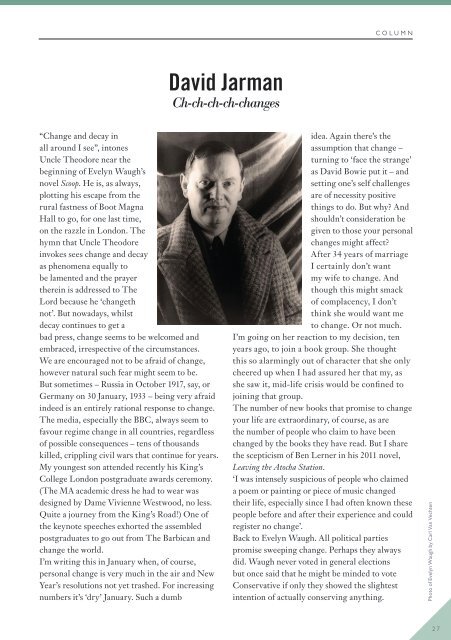Viva Lewes Issue #137 February 2018
You also want an ePaper? Increase the reach of your titles
YUMPU automatically turns print PDFs into web optimized ePapers that Google loves.
COLUMN<br />
David Jarman<br />
Ch-ch-ch-ch-changes<br />
“Change and decay in<br />
all around I see”, intones<br />
Uncle Theodore near the<br />
beginning of Evelyn Waugh’s<br />
novel Scoop. He is, as always,<br />
plotting his escape from the<br />
rural fastness of Boot Magna<br />
Hall to go, for one last time,<br />
on the razzle in London. The<br />
hymn that Uncle Theodore<br />
invokes sees change and decay<br />
as phenomena equally to<br />
be lamented and the prayer<br />
therein is addressed to The<br />
Lord because he ‘changeth<br />
not’. But nowadays, whilst<br />
decay continues to get a<br />
bad press, change seems to be welcomed and<br />
embraced, irrespective of the circumstances.<br />
We are encouraged not to be afraid of change,<br />
however natural such fear might seem to be.<br />
But sometimes – Russia in October 1917, say, or<br />
Germany on 30 January, 1933 – being very afraid<br />
indeed is an entirely rational response to change.<br />
The media, especially the BBC, always seem to<br />
favour regime change in all countries, regardless<br />
of possible consequences – tens of thousands<br />
killed, crippling civil wars that continue for years.<br />
My youngest son attended recently his King’s<br />
College London postgraduate awards ceremony.<br />
(The MA academic dress he had to wear was<br />
designed by Dame Vivienne Westwood, no less.<br />
Quite a journey from the King’s Road!) One of<br />
the keynote speeches exhorted the assembled<br />
postgraduates to go out from The Barbican and<br />
change the world.<br />
I’m writing this in January when, of course,<br />
personal change is very much in the air and New<br />
Year’s resolutions not yet trashed. For increasing<br />
numbers it’s ‘dry’ January. Such a dumb<br />
idea. Again there’s the<br />
assumption that change –<br />
turning to ‘face the strange’<br />
as David Bowie put it – and<br />
setting one’s self challenges<br />
are of necessity positive<br />
things to do. But why? And<br />
shouldn’t consideration be<br />
given to those your personal<br />
changes might affect?<br />
After 34 years of marriage<br />
I certainly don’t want<br />
my wife to change. And<br />
though this might smack<br />
of complacency, I don’t<br />
think she would want me<br />
to change. Or not much.<br />
I’m going on her reaction to my decision, ten<br />
years ago, to join a book group. She thought<br />
this so alarmingly out of character that she only<br />
cheered up when I had assured her that my, as<br />
she saw it, mid-life crisis would be confined to<br />
joining that group.<br />
The number of new books that promise to change<br />
your life are extraordinary, of course, as are<br />
the number of people who claim to have been<br />
changed by the books they have read. But I share<br />
the scepticism of Ben Lerner in his 2011 novel,<br />
Leaving the Atocha Station.<br />
‘I was intensely suspicious of people who claimed<br />
a poem or painting or piece of music changed<br />
their life, especially since I had often known these<br />
people before and after their experience and could<br />
register no change’.<br />
Back to Evelyn Waugh. All political parties<br />
promise sweeping change. Perhaps they always<br />
did. Waugh never voted in general elections<br />
but once said that he might be minded to vote<br />
Conservative if only they showed the slightest<br />
intention of actually conserving anything.<br />
Photo of Evelyn Waugh by Carl Van Vechten<br />
27


















